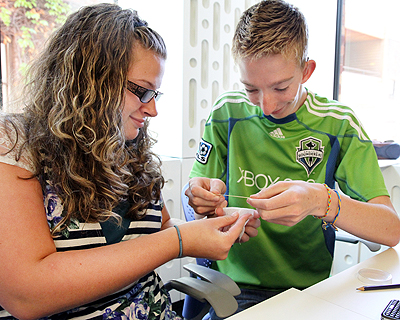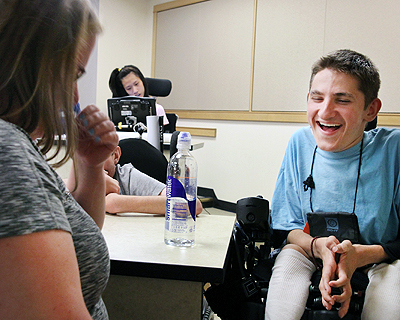Recruiting Students with Disabilities to Your Internship
Corporate success depends on attracting the best minds. However, many companies report their number one problem is locating talented workers.

Including employees with disabilities enhances creativity and potential for solutions in your workforce, a benefit noted by William Wulf, president of the National Academy of Engineering, who stated, "...creativity does not spring from nothing; it is grounded in our life experiences...lacking diversity...we limit the set of solutions that will be considered and we may not find the best, the most elegant solution."
Below you will find information on how to include people with disabilities in your workforce, expectations regarding accommodations, and a list of organizations for further information and assistance.
Internships
One way to gain an edge in recruiting is to identify talented people before they graduate from college. Internship programs can help identify individuals from which you may ultimately hire. Internships and other work-based learning programs give the employer and the student opportunities to "test each other out" and determine if they make a good match, saving the company time and money in recruitment efforts. These programs also give the company an opportunity to participate in a student's training and, for a student with a disability, allow both the student and the employer to test different worksite accommodations. Consult the following article for an example of the value of hiring interns.
Recruitment of Applicants with Disabilities
Add a statement of your interest in receiving applicants with diverse characteristics, including those with disabilities, to your company's existing recruitment materials. Disseminate announcements in college campus career service centers, academic departments, and disabled student service offices. Your state division of vocational rehabilitation, department of services for the blind, and governor's committee on employment of people with disabilities can also provide you with referrals for qualified candidates. For additional ideas, consult the following article:
Where can I find interns and employees with disabilities?
Accommodations
In a world where technology is a necessary aspect of almost every business, physical ability is seldom a limitation. Intellect and technical capability are what count. Assistive technology and other accommodations make it possible for people with a wide range of disabilities to be competitive in today's labor market.
The Americans with Disabilities Act of 1990 (ADA) requires that employers with fifteen or more employees make reasonable accommodations in the workplace for employees with disabilities. Accommodations are to be made on a case-by-case basis and may not be required when costs create an undue hardship. These accommodations usually cost less than the employer expects. Dan Hodge, Recruitment Manager for AirTouch Cellular, remarked that the cost of making "accommodations for a student or for an employee are much less than we ever anticipate they are going to be in a situation. And, typically, the accommodations are easy for us to make." In fact, the Job Accommodation Network (JAN), a toll-free service that advises businesses and individuals about accommodations, reports that almost half of all accommodations cost less than $600.
Tax Credit Programs
There are two tax credit programs available to assist with workplace accommodations - the Disabled Access Tax Credit and the Architectural Barrier Tax Deduction. Consult the following article for further information:
Are there tax incentives for hiring people with disabilities?
How Do I Determine Appropriate Accommodations?
The employee or intern with a disability is always your best resource when it comes to determining appropriate workplace accommodations. It is likely that they know what will be needed to succeed on the job, including specific products that might need to be purchased.
The college disabled student services office can assist you when determining appropriate accommodations for a student worker from that school; however, do not contact them without the students' permission. State vocational rehabilitation offices and other community agencies that serve people with disabilities and the Job Accommodation Network (JAN) and can also assist businesses and individuals with general questions about accommodations.
Who Is Responsible for Providing Accommodations?

The employee or intern is responsible for providing personal accommodations, such as hearing aids, wheelchairs, and personal attendants. In most cases, it is the employer's responsibility to provide on-site job accommodations. It is sometimes possible, however, for the employer to receive tax credits and incentives for doing so. Your state division of vocational rehabilitation can assist you with obtaining information about these programs.
If the worker is an intern, however, it is best if the school and the business collaborate to provide reasonable accommodations. For example, in some cases, the school may loan the student and the employer the necessary assistive technology for the length of the internship experience. Consult the following article for further information.
Who is responsible for providing accommodations for student interns?
DO-IT Resources
DO-IT (Disabilities, Opportunities, Internetworking, and Technology) works to increase the successful participation of people with disabilities in academic programs and careers.
For more information on hiring individuals with disabilities, view the short video Finding Gold: Hiring the Best and the Brightest or read the publication with the same title from DO-IT.
In addition, hundreds of questions and answers, case studies, and promising practices can be found in the searchable Employment Office Knowledge Base.
More Resources
In February of 2015, the White House released Recruiting, Hiring, Retaining, and Promoting Employees with Disabilities: A Resource Guide for Employers. The guide was created by the Curb Cuts to the Middle Class Initiative, a Federal cross-agency effort working to increase equal employment opportunities and financial independence for individuals with disabilities. The guide contains information on best practices, accommodations, and the legal framework for hiring individuals with disabilities.
Additionally, the following national resources are rich with information about working with people with disabilities.
AHEAD (Association on Higher Education and Disability)
AHEAD is a member organization comprised of disabled student service professionals in higher education.
704-947-7779(voice/TTY)
704-948-7779 (FAX)
www.ahead.org/home
ENTRY POINT!
American Association for the Advancement of Science (AAAS)
ENTRY POINT! is an internship program for college students with disabilities majoring in computer science, engineering, mathematics, or physical science. Contact ENTRY POINT! to inquire about becoming a part of this program.
202-326-6649 (voice/TTY)
202-371-9849 (FAX)
www.aaas.org/programs/entry-point
Great Lakes ADA Center
800-949-4232 (V/TTY)
312-413-1407 (V/TTY)
www.adagreatlakes.com
The Great Lakes ADA Center's mission is to increase awareness and knowledge with the ultimate goal of achieving voluntary compliance with the ADA. This is accomplished by providing customized training, expert assistance, and dissemination of information developed by various sources. They mainly serve Illinois, Indiana, Michigan, Minnesota, Ohio, and Wisconson, and are run from the University of Illinois, Chicago.
Office of Disability Employment Policy
U.S. Department of Labor
The Office of Disability Employment Policy shares their experience in providing accommodations for students in the classroom that may be useful to you when determining appropriate accommodations on the job.
866-633-7365
877-889-5627 (TTY)
www.dol.gov/agencies/odep
I-NABIR, The Association of Projects with Industry
I-NABIR is an organization of federally funded programs that provides employment services for people with disabilities under the guidance of employers. Contact I-NABIR for locations of projects in your area.
202-543-6353
www.inabir.org
Rehabilitation Services Administration (RSA)
RSA oversees programs such as state vocational rehabilitation offices that help people with disabilities gain employment. State and local vocational rehabilitation programs are listed in your telephone directory.
202-245-7488
Workforce Recruitment Program
Through the Workforce Recruitment Program employers may request a prescreened database of college students with disabilities available for summer or permanent positions.
www.wrp.gov/wrp